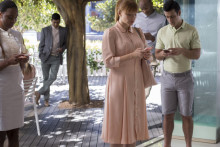In this edition, the British television series Black Mirror (2011 – present), specifically the episode Nosedive, is analysed by Jan van Dijk, professor of Communication Science. If you have not watched this episode yet, beware of spoilers!
The plot
In this episode of Black Mirror, we follow Lacie, a young woman in a fictitious world. The people in this futuristic society rate each other on a scale of one to five, using an app. If someone brings their colleague a cup of coffee, they get five stars. If they share a great holiday photo, another five stars. If they scream at a customer service agent, one star. This rating determines the users’ socioeconomic status and – as the episode makes clear – virtually everyone uses the app.
Lacie starts out with a rating of 4.2 and she is doing everything she can to raise it to a 4.5. That will give her a sizeable discount on a desirable apartment. It seems impossible, until an old school friend asks her to be her bridesmaid. That presents her with a unique opportunity, because all the guests at the wedding have a rating of 4.5 or higher. A single good score from one of those people would give her own rating a serious boost – not to mention what a whole crowd could do. Unfortunately, Lacie does not make it to the wedding unscathed.
First impression
Van Dijk: ‘Nosedive is very dystopian. It presents an awful vision of the future and illustrates the consequences of the digital revolution. The pastel colours also stood out to me. Everything is made to look better than it is – sort of like our Facebook profiles.’
Realism/feasibility
Although the series is dystopian, Van Dijk believes this episode has many similarities with our current society. ‘Take the social credit system in China,’ Van Dijk says. ‘It was introduced in 2016 and is used to rate the online behaviour of Chinese citizens. If you show good behaviour – by the government’s definition, that is – you gain credit. Citizens with high scores have a better chance of, for example, getting a job with the government.’
‘The internet is a mirror of our society. In China, it is part of the country's brand of modern totalitarianism, but we have a rating system in our Western society as well, albeit in a more fragmented manner. In our society, a single rating does not exist (yet), although the Tax Authority does evaluate our tax returns and we have registrations with the Credit Registration Office. Take Uber taxis or Airbnbs; they rely entirely on their rating.’
‘Of course, socioeconomic distinction is nothing new. A hundred years ago, there was a major social gap between the working class and the elite. One wore a cap, the other a hat. There is one big difference, however: using numerical values, like in this episode of Black Mirror, is far more quantitative. That ties into computers. The danger lies in the systematic aspect of quantification. Once you are put in a certain category, it is hard to break free. In a worst-case scenario, that leads to discrimination and apartheid.’
‘Facebook’s algorithms, for example, which also use a rating system, are secret. No one knows what characteristics are assigned which score. These algorithms should be made public, because that would be the democratic thing to do. We have no say in it right now and that makes it dangerous.’
‘The question is whether a rating would change our behaviour in any way. It is not necessarily dystopian, because rewarding good behaviour can benefit society. However, it is easier for wealthy people to meet the standards. The reverse is also true; those with fewer capital means have a harder time meeting the standards. A rating system therefore exacerbates inequality.’

Stray observations
‘The dystopian world of Nosedive offers no privacy at all. Our society appears to be heading in the same direction. I often use the example of the Second World War. My parents offered refuge to a number of Jews, but that would be impossible in our modern society. Within just a few hours, they would be identified and arrested.’
‘Lacie knows that the wedding can do wonders for her rating. Highly educated people are better able to make these kinds of strategic choices that will positively affect their online rating. In that sense, technology is great for the people at the top, but horrible for those at the bottom end of our society.’
‘I especially liked the final scene of the episode, in which Lacie no longer cares about her app. She stops pretending to be better than she is and starts screaming and cussing at everyone.’
Prefer to read the printed version? Grab a copy of our new Science & Technology Magazine.







